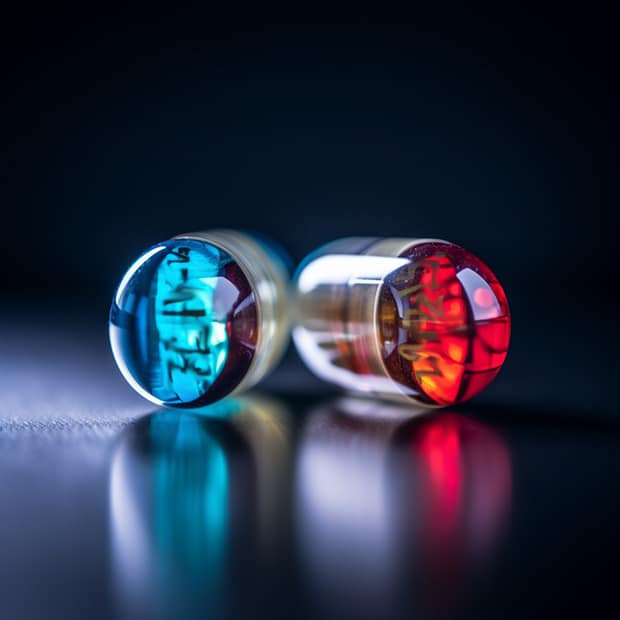Focalin and Ritalin are two common options for treating ADHD (Attention Deficit Hyperactivity Disorder). These stimulant medications both belong to the same class of drugs called methylphenidates, which work by increasing the levels of dopamine and norepinephrine in the brain. These neurotransmitters are involved in attention, motivation, and impulse control. So, by boosting their activity, Focalin and Ritalin ADHD medications can help people focus on tasks better and control their impulses.
However, Focalin and Ritalin are not identical drugs as they do have important differences to know about. In this blog post, we will compare and contrast Focalin and Ritalin stimulant drugs to help you understand their similarities and differences, and how to choose the best stimulant medication for your ADHD treatment.
What is Focalin?
Focalin is the brand name for dexmethylphenidate, a central nervous system stimulant that is used to treat ADHD. Focalin has the same chemical structure as Ritalin, except that it contains only the active ingredient form of the molecule. Focalin works by blocking the reuptake of dopamine and norepinephrine in the brain, which increases their levels and enhances attention, motivation, and impulse control.
Focalin is available in different dosage forms, such as immediate-release tablets and extended-release capsules (known as Focalin xr). Research has found positive effects of treating ADHD with Focalin prescription drugs. In one study, ADHD patients that were treated with Focalin displayed significant improvements in their symptoms as compared to people who received a placebo.

What are possible side effects of Focalin?
Focalin can cause various side effects that may affect different body parts. Some common side effects include sleep problems, mood swings, nausea, headache, decreased appetite, and weight loss. These side effects are usually mild and may go away with time or dose adjustment.
However, some side effects of Focalin can be severe and require immediate medical attention. These include:
- Cardiovascular problems, such as chest pain, fast heartbeat, stroke, and heart attack.
- Psychiatric problems, such as paranoia, aggression, hallucinations, and delusions.
- Allergic reactions include skin rash, hives, itching, swelling, or trouble breathing.
Focalin should not be used by people who have health conditions such as Tourette’s syndrome, glaucoma, severe anxiety, structural cardiac abnormalities, heart disease, high blood pressure, or a family history of heart problems. It should be used cautiously and under close monitoring by a doctor in people with other conditions that may affect the heart or blood pressure, such as thyroid problems, diabetes, or kidney disease.
It’s best to avoid taking Focalin with other medications or substances that can affect the heart or blood pressure, such as antidepressants, decongestants, caffeine, alcohol, or nicotine.
What is the price of Focalin?
The price of Focalin may vary depending on the pharmacy, the dosage, the formulation, and if it’s covered by insurance. According to Drugs.com, the average cost for 5mg Focalin oral tablets is around $111 for 100 tablets, while the cost for 10 mg tablets is around $156 for 100 tablets.
However, these prices are for cash-paying customers and are not valid with insurance plans. There may be coupons, copay cards, or patient assistance programs available that can lower the price of Focalin.
What is Ritalin?
Ritalin is the brand name for methylphenidate, a central nervous system stimulant medication that is used to treat narcolepsy and ADHD. Ritalin has the same chemical structure as the medication Focalin, but it does have some crucial differences, such as that it is stronger medication with a longer half-life and comes in a greater variety of dosage forms, such as liquid, skin patches, and chewable tablets.
Ritalin contains both the d- and l-isomers of methylphenidate, whereas Focalin only contains the di-isomer. This is the more powerful form of the drug, which can be more effective for some ADHD sufferers and it can also cause a fewer number of side effects.
Ritalin works by blocking the reuptake of dopamine and norepinephrine in the brain, which increases their levels and enhances attention, motivation, and impulse control.
Benefits and drawbacks of Ritalin for ADHD
Ritalin has some benefits and drawbacks for ADHD treatment. On the positive side, Ritalin can reduce the symptoms of ADHD such as impulsivity, hyperactivity, and inattention. It can help people with ADHD focus better, reduce fidgeting, and control their impulses, while improving mood, self-esteem, and academic performance.
On the negative side, Ritalin can cause some side effects such as insomnia, headache, decreased appetite, nausea, blurry vision, and high blood pressure. It can also affect growth in children and teens.
Ritalin is a controlled substance that has a high potential for abuse and dependence. It can cause tolerance, withdrawal, and addiction if misused or taken in high doses. It can also interact with other medications and substances that affect the brain, such as Rasagiline that’s used to treat Parkinson’s disease. Ritalin may not work for everyone with ADHD or may lose its effectiveness over time.
Some evidence from clinical trials support the use of Ritalin for ADHD. For example, a Cochrane systematic review that included 185 randomized controlled trials involving more than 12,000 children or adolescents found that Ritalin led to modest improvements in ADHD symptoms, general behaviour, and quality of life.
Another trial that involved 134 children with ADHD found that Ritalin LA, a once-daily extended-release formulation of Ritalin, was superior to placebo in improving ADHD symptoms throughout the day. These studies suggest that Ritalin can be effective and safe for some people with ADHD or related conditions.
Ritalin Side Effects
Ritalin can cause side effects such as agitation, an energized feeling, a headache, trouble sleeping, moodiness, anxiety, stomach upset and nausea, and reduced appetite. These side effects are usually mild and may go away with time or dose adjustment.
However, some side effects of Ritalin can be severe and require immediate medical attention. These include chest pain, joint pain, skin rashes or hives, stomach pain, fever, increased blood pressure, increased heart rate, and poor blood circulation.
What is the price of Ritalin?
According to Drugs.com, the average cost for Ritalin oral tablet 5 mg is around $89 for a supply of 100 tablets. However, these prices are for cash-paying customers and are not valid with insurance plans. The generic version costs approximately $16 for 30 tablets.
As with Focalin, you might be able to make use of discounts, coupons, or patient assistance programs that decrease the amount you need to pay, depending on where you source the medication.
Are Focalin and Ritalin the same thing?
Focalin and Ritalin are similar in many ways. They both belong to the same class of drugs called methylphenidates, which are central nervous system stimulants that work by increasing the levels of dopamine and norepinephrine in the brain. These neurotransmitters are involved in attention, motivation, and impulse control. Focalin and Ritalin are both FDA approved to treat ADHD symptoms in children and adult patients.
They both have similar efficacy, side effects, warnings, drug interactions, and cost. They both can cause insomnia, headache, decreased appetite, nausea, blurry vision, high blood pressure, and growth suppression. If you experience serious side effects, you should contact your doctor immediately. Both drugs can interact with other substances and medications, such as caffeine and antidepressants.
How are Focalin and Ritalin different?
Focalin and Ritalin are different in some ways. They both have the same chemical structure, but Focalin contains only the active form of the molecule, while Ritalin contains both the active and inactive forms. This means that Focalin is more potent than Ritalin.
Here are other differences:
- Focalin comes in immediate-release and extended-release formulations. These can stay for approximately 6-12 hours in your system, but it depends on various factors, such as age and metabolism. While Ritalin only used to be available in immediate-release formulations, now it’s available in slow-release and extended-release forms. Ritalin can stay in your system for a few hours, although it can be present in your urine for up to two days.
- Focalin and Ritalin have different formulation options. You can get Focalin as capsules that you can open and sprinkle over applesauce. By comparison, Ritalin is available in more forms, such as pills, liquid solutions, chewable tablets and skin patches.
- Focalin is a bit more expensive than Ritalin.
Although it’s assumed that, since Focalin is more potent, it’s more likely to be abused or misused than Ritalin, this isn’t true. Both medications are Schedule II controlled substances by the Drug Enforcement Administration (DEA), so one has to be careful to prevent misuse.
Ritalin vs Focalin: Which one is the best option to treat ADHD?
There is no definitive answer to which one is the best option for ADHD, as different people may respond differently to Focalin and Ritalin. Whether you’re prescribed Focalin or Ritalin by your doctor will depend on various factors. Things that might make you want to be on Ritalin instead of Focalin include:
- If you want treatment for ADHD and/or narcolepsy, Ritalin is recommended.
- If you want medication that’s available in many forms, as Ritalin is available in the form of chewable tablets, skin patches, and more.
- Ritalin can be more affordable than Focalin, but both medications are available in low-cost generic form.
Things that might make you want to consider taking Focalin instead of Ritalin include:
- If you want an ADHD medication that’s got fewer side effects, as Focalin is commonly prescribed by healthcare providers for this reason.
Conclusion
Both Focalin and Ritalin are two medications that work well to treat ADHD symptoms, so your healthcare provider should advise you on which one is better for you to take. However, it’s good to air any concerns you might have about taking methylphenidate medications so that your doctor will be able to prescribe the most effective ADHD medication for you, depending on your symptoms, reactions to medication, and other factors.

